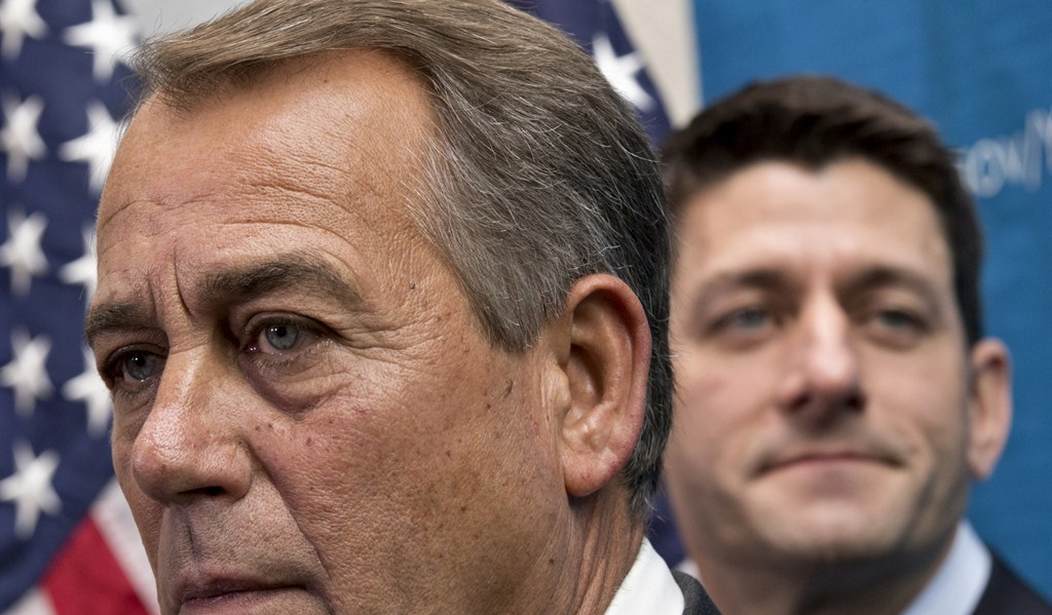There is little to like in the debt-heavy, budget deal that is about to pass Congress. It does not seriously attack billions of dollars in wasteful spending and barely nicks monster deficits that are forecast to grow by more than $6 trillion over the next 10 years.
The nonpartisan Congressional Budget Office crunched the numbers and said the deal would cut the deficits by a mere $85 billion over the next 10 years in the absence of future spending reductions.
About $62 billion of that will roll back a big chunk of the automatic sequester spending cuts. The remainder, some $23 billion, would be applied to reducing deficits.
That's a minuscule amount in an annual budget that is now approaching $4 trillion a year in ever-higher spending.
This isn't a serious budget. It's an election cycle deal that sweeps the government's fiscal troubles under the rug to give voters in the 2014 midterm congressional races the chance to answer this question:
Do you want to continue with a divided Congress that prevents our country from getting its fiscal house in order through top-to- bottom spending reductions that shrinks the deficits, reduces tax rates and strengthens our economy?
The nation's debt-ridden mess stems from a politically divided Congress that has lost sight of Thomas Jefferson's vision of "a wise and frugal" government.
Republicans want to make sensible but deeper budget cuts and needed reforms in discretionary and entitlement spending, while reducing tax rates to unlock new business investments that foster job growth and boost tax revenues that will also shrink the deficit.
Recommended
Democrats like the spending levels we've got now, and are working hard to raise them by creating a sea of new programs, agencies and entitlements like Obamacare.
They don't want to cut tax rates, they want to rise them, even in a lumbering, job-starved economy.
The compromise hammered out by Democratic Sen. Patty Murray of Washington and Republican Rep. Paul Ryan of Wisconsin with one political goal in mind.
Fashion a budget that can not only win the approval of the GOP- run House and the Democrat-controlled Senate, but also get past a very liberal, Democratic president who never met a spending bill he didn't like.
A budget that tries to achieve that is by definition a piece of legislation that will satisfy no one. And that's what lawmakers will vote on before leaving for the Christmas holidays.
There are some good things here and there in this bill to applaud. The Pentagon, hit hard by sequestered budget cuts, will get $2 billion more than last year.
It will curb taxpayer contributions to federal employee pensions, asking new government workers after Jan. 1 to pay more into their retirement accounts. Businesses will pay higher premiums for federal pension insurance, and security fees will rise for the airlines and their passengers.
But this was not the grand bargain that House Speaker John Boehner had sought in the past and that Paul Ryan wants to eventually achieve.
For the Republican leadership, this is all about keeping the government financed, open and running -- putting this year's damaging federal shutdown behind them -- as they head toward the start of a critical election year.
The disastrous Obamacare rollout, and a lengthening list of other health care problems it has spawned, plus an economy still in recovery, has hurt the Democrats a great deal more.
The shutdown was of brief duration and will gradually recede in most voters' minds. But Obamacare will impose higher medical care costs on providers, increased health insurance premiums, and cancelled policies for as long as it is the law of the land.
Meantime, the compromise budget that appears to be headed for approval is stirring bitter opposition among the GOP's conservative base and spawning a number of party primary challenges in next year's races.
"This proposal swaps debt reduction today and next year, for the dubious promise of debt reduction a decade from now," said former Congressman Chris Chocola who heads the Club for Growth that has a record of defeating GOP incumbents in the primaries.
"Apparently, there are some Republicans who don't have the stomach for even relatively small spending reductions that are devoid of budgetary smoke and mirrors," Chocola said. Then he issued this dire political warning to the GOP:
"If Republicans work with Democrats to pass this deal, it should surprise no one when Republican voters seek alternatives who actually believe in less spending when they go to the ballot box."
Boehner shot back in a news conference, charging that the Club for Growth and Heritage Action for America were mounting their attack on the deal to boost their fundraising campaigns.
"They're using our members and they're using the American people for their own goals," he said.
What we have going on here is a deep disagreement over legislative strategies to achieve the GOP's long-held policy goals.
The GOP establishment's tea party critics want their party to oppose any deal that does not significantly cut spending -- even if it means yet another government shutdown.
Chocola, for example, is calling on House GOP leaders to pass a continuing resolution that "preserves the savings from the sequester," even though that can't win support in the Senate.
But party leaders in both chambers think that strategy is legislatively flawed and politically harmful to its chances of taking control of the Senate and strengthening its numbers in the House next year when they'll be in a much stronger position to dictate budget policy in Obama's last two years.
They want to keep the focus squarely on Obamacare and a painfully sluggish, high unemployment economy in the midterm campaigns, unimpeded by distracting threats of another shut down.
The Republicans believe they can beat the Democrats on those two issues next year, which is why this budget deal will sail through Congress with strong GOP support.

























Join the conversation as a VIP Member